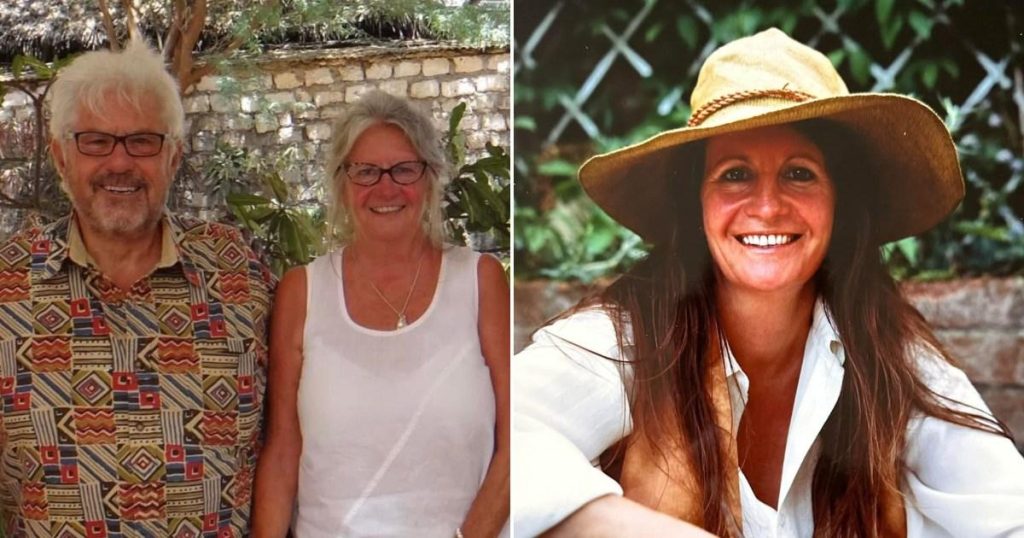A Desperate Plea from Kenya: The Story of Lee Flint’s Stranded Illness
Lee and Jack Flint, a British couple with a long-standing connection to Kenya, embarked on what they believed would be a celebratory trip in September. Having dedicated the past 30 years to charitable work and holidays in the East African nation, their latest visit held special significance: it marked Jack’s triumph over cancer. However, beneath the surface of celebration, a hidden crisis was brewing. Lee, 77, harbored a secret about her deteriorating health, concealing recent medical tests and their concerning results from her husband. Weeks into their stay, the hidden truth emerged tragically. Jack found Lee unresponsive in their hotel room, a discovery that revealed the severity of her undisclosed illness. She was rushed to intensive care, where doctors diagnosed kidney and liver failure, compounded by blood poisoning and an internal bleed. The joyous trip transformed into a desperate fight for survival, thousands of miles from home.
The Flints’ predicament took a devastating turn when an error on their travel insurance forms came to light. In her desire to shield Jack from worry during his recovery from chemotherapy, Lee remained silent about her health concerns. Consequently, Jack, while filling out the insurance paperwork, omitted any mention of Lee’s pre-existing condition. This seemingly small oversight voided their insurance coverage, leaving them financially stranded in the face of mounting medical bills. The exact nature of Lee’s test results and her awareness of their implications remain unclear, as her current medical condition renders her unable to communicate. Her son, Jamie, acknowledges the gravity of the mistake, attributing it to the fatigue and stress both his parents were experiencing during that period. He emphasizes that his mother, despite being an intelligent woman, made an error with profound consequences.
The financial burden facing the Flints is staggering. The cost of transporting Lee back to the UK via a medically equipped flight is estimated at £80,000, a sum beyond their reach. Adding to this is the accumulating cost of Lee’s ongoing hospital care, which continues to escalate daily. The couple’s deep-rooted connection to Kenya, spanning decades of philanthropic work, adds a poignant layer to their crisis. Since 1991, they have spent extended periods in Watamu, sponsoring schools, supporting medical professionals, and providing much-needed supplies to local communities. Their most recent trip saw them arrive with 62kg of clothing and reading glasses intended for distribution to schoolchildren and orphans, a testament to their ongoing commitment. Now, facing an overwhelming financial crisis, the family finds themselves on the receiving end of aid, relying on the generosity of others.
Jamie, Lee’s son, has launched a GoFundMe campaign to raise the funds necessary for his mother’s repatriation and medical expenses. Stranded in England, he expresses feelings of helplessness and frustration, watching the situation unfold from afar. He urges others to learn from his family’s ordeal, emphasizing the importance of meticulous attention to detail when completing insurance forms, particularly for individuals with pre-existing health conditions or older adults. He underscores the critical need for repeated reviews and careful consideration of every question to avoid the devastating consequences of a seemingly minor oversight. Jamie acknowledges the stringent nature of insurance policies but expresses his anger at the situation. His primary focus remains on bringing his mother home, a goal made increasingly challenging by the exorbitant hospital bills.
The Flints’ story serves as a stark cautionary tale about the intricacies of travel insurance and the potential consequences of overlooking critical details. While acknowledging the importance of insurance companies adhering to their policies, Jamie’s plea highlights the human cost of such situations. He expresses gratitude for the outpouring of support received through the GoFundMe campaign, admitting that the kindness of strangers has moved him deeply. He emphasizes his desire for no other family to endure a similar experience, underscoring the importance of vigilance and thoroughness when dealing with insurance matters.
The unfolding drama of Lee Flint’s illness in Kenya demonstrates the fragility of health and the unexpected challenges that can arise even during seemingly joyful occasions. The family’s long-standing commitment to charitable work in Kenya, coupled with the unforeseen circumstances of Lee’s illness and the subsequent insurance complications, creates a compelling narrative of human vulnerability and resilience. The story also underscores the importance of clear communication about health issues, especially between family members, and the crucial role of travel insurance in safeguarding against unforeseen medical emergencies abroad. The Flints’ situation serves as a poignant reminder that even the most meticulously planned trips can be derailed by unforeseen health crises, highlighting the necessity of adequate preparation and a thorough understanding of insurance policies. Their ordeal stands as a testament to the unexpected turns life can take and the importance of support networks, both familial and communal, in times of crisis.


